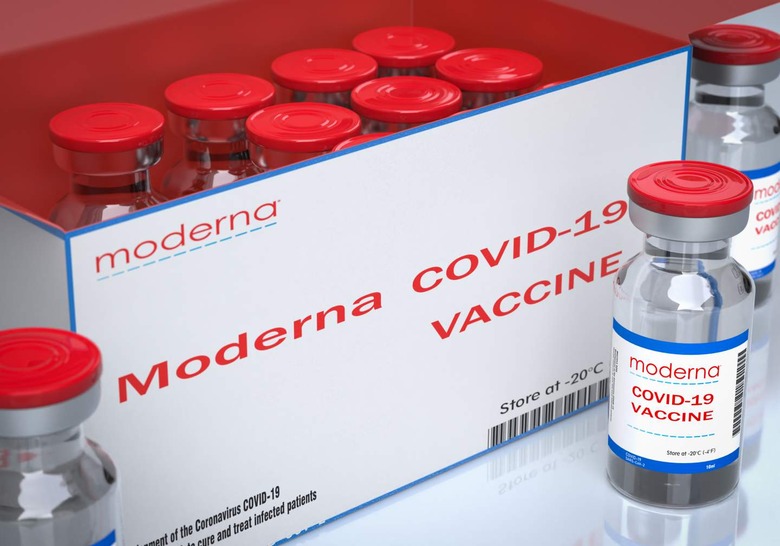The FDA Just Changed The Moderna COVID Booster Rules
The U.S. Food and Drug Administration (FDA) has announced a change to how long adults must wait before they can get the Moderna COVID-19 vaccine booster shot. Starting immediately, individuals aged 18 and older can now get their booster shot after at least five months have passed since the completion of the primary series of the Moderna vaccine.
The authorization has been changed in response to the ongoing wave of SARS-CoV-2 variant-of-concern Omicron. Compared to the previous variants, such as the original SARS-CoV-2 virus, the Omicron variant has proven to be much more contagious. As it spreads throughout the world at an unprecedented rate, the FDA has deemed it necessary to shorten the time between the primary series of the Moderna vaccine and the booster shot.
According to Peter Marks, M.D., Ph.D., director of the FDA's Center for Biologics Evaluation and Research, getting vaccinated continues to be the best way to limit the risk of catching COVID. Marks explained, "Vaccination is our best defense against COVID-19, including the circulating variants, and shortening the length of time between completion of a primary series and a booster dose may help reduce waning immunity."
Prior to this change, the waiting time between the second shot and the booster shot was six months. Bringing it down to five months makes it more consistent with other available mRNA vaccines—the Pfizer-BioNTech vaccine can also be boosted after five months have passed (via CDC).
Who can get the Moderna booster shot?
The FDA details who exactly qualifies for the booster shot and what possible side effects can be caused by the third COVID-19 vaccine in an official announcement. Qualifying for the Moderna booster shot is easy: As long as you are over 18 and five months have passed since your primary vaccination series, you can get vaccinated once again. Even individuals who previously received a Pfizer or a Janssen (Johnson & Johnson) vaccine can take the Moderna booster shot.
It's worth noting that teens aged 12 to 17 can only receive Pfizer booster shots, as both Moderna and Johnson & Johnson have not been authorized for that age group yet. The CDC explains how to schedule your booster shot on its website. The agency also notes that both the Pfizer and the Moderna vaccines are preferred in most situations over the J&J vaccine.
According to the FDA, the possible side effects of receiving a COVID-19 booster shot are about the same as those of the primary shots. The most common side effects include pain, swelling, and redness at the injection site. You may also experience tiredness, a headache, muscle and joint pains, as well as fever-like symptoms and chills. You can find out more directly from the CDC.

